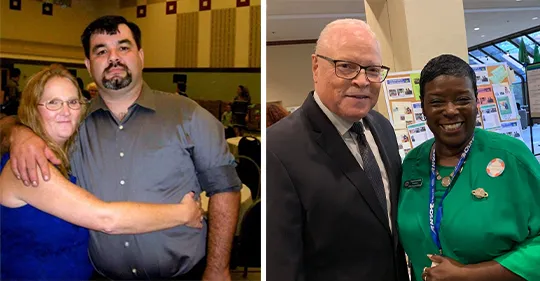Veterans will be disproportionately affected if the Senate fails to provide state, local aid

AFSCME members Dawn Bundick of Alaska and Chris Woloscuk of Florida are veterans and public service employees – two facts that make them especially vulnerable as the COVID-19 pandemic ravages the U.S. economy.
If Congress fails to provide at least $1 trillion in federal aid to struggling states, cities, towns and school districts, millions of state and local government workers could be shown the door as their employers struggle to cope with plummeting tax revenues.
And a large share of those at-risk government employees are veterans, according to the Economic Policy Institute.
Unlike the House, which included $1 trillion in state and local aid in the Heroes Act that passed the chamber in May, the Senate and White House have refused to add state and local aid to their latest coronavirus relief legislation.
This threatens vital public services and the workers who provide them and could result in an additional 5.3 million public and private sector service workers losing their jobs by the end of 2021, EPI says. A total of 1.5 million government workers have already lost their jobs since the start of the pandemic.
EPI data shows that more than 1 million veterans – 13.2% of those who served in the military – work for state and local governments. Since they face severe borrowing restrictions, states, cities, towns and school systems rely heavily on federal aid to continue to provide services that people need and deserve – everything from collecting trash to processing unemployment checks to operating water and sewer plants to running public schools.
Bundick, president of the Alaska State Employees Association (AFSCME Local 52), is an investigator with the state Department of Corporations, Business and Professional Licensing, and a Navy Reserves veteran. She worked as an explosive materials handler in Washington state for 10 years before joining the State of Alaska and serves as president of the local chapter of the Veterans of Foreign Wars.
During a press call last week, she said she’s worried about the impact that cuts to Medicaid and the Supplemental Nutrition Assistance Program would have on veterans who rely on those programs to make ends meet.
If Senate fails to provide $1 trillion in aid to state and local governments, “there is no telling what cuts will have to be made down the line,” Bundick said. “I ask the Senate to take a stand for America’s communities and for the millions of veterans who work in the public service and depend on public services to help make ends meet.”
EPI data shows that of all the states, Alaska has the second-highest share of veterans serving in state and local government – 10%.
Woloscuk, a member of Local 1279 (AFSCME Florida), is an Air Force veteran who serves as a fire and rescue service technician at the Jacksonville Fire and Rescue Department. He is responsible for maintaining every vehicle in the fleet, including million-dollar aerial equipment.
After serving in the Air Force, Woloscuk began working at Jacksonville Fire and Rescue in 2011 and said the job gives him the “strong sense of purpose I was looking for.”
As tough as things have been since the start of the coronavirus pandemic, they will get a lot worse if the Senate fails to come up with state and local aid, he said.
“We are short-staffed and I am afraid that the veterans that came on after me are going to be the first ones let go if the cities and counties do not get this funding,” Woloscuk warned. “So I am asking that Senate leadership take up and provide the necessary funding for our cities, counties and states.”
EPI data shows that Florida has the third-highest number of veterans working in state and local government – 76,500.
